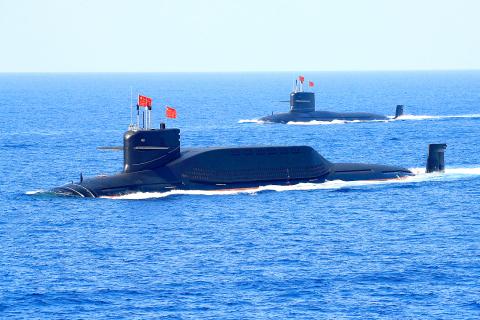China could use force to push Taiwan into unification or into unification dialogue, the Pentagon said in its annual military report on China issued on Thursday.
In the report submitted to the US Congress, the Pentagon said that China is likely to pursue a measured approach by demonstrating its readiness to use force or take punitive actions against Taiwan.
“The PLA [Chinese People’s Liberation Army] could also conduct a more comprehensive campaign designed to force Taiwan to capitulate to unification, or unification dialogue, under China’s terms,” the report said.

Photo: Reuters
Taiwan remains the PLA’s main strategic direction and serves as one of the geographic areas Beijing identifies as having strategic importance, it said.
“China’s overall strategy toward Taiwan continues to incorporate elements of both persuasion and coercion to hinder the development of political attitudes in Taiwan favoring independence,” the Pentagon said.
However, the analysis appeared to downplay prospects for a large-scale amphibious invasion, saying that it could strain China’s armed forces and invite international intervention.
It also noted the possibility of limited missile strikes.
“China could use missile attacks and precision airstrikes against air defense systems, including air bases, radar sites, missiles, space assets and communications facilities, to degrade Taiwan’s defenses, neutralize Taiwan’s leadership or break the Taiwan people’s resolve,” the report said.
Taiwan has much smaller military capabilities than China and the gap is growing, it added.
According to its estimate, China has 2,600 fighter jets, including 1,100 fighter trainers, while Taiwan has only 450.
China also has 450 transport planes, 450 bombers and 150 special mission aircraft, while Taiwan deploys only 30 transport planes and 30 special mission aircraft, and has no bombers, the Pentagon said.
While China speaks of peaceful unification, its government has never given up the use of force as an option and continues to develop and deploy advanced military capabilities, paving the way for a potential military campaign to increase pressure on Taipei, the report said.
In the event of a protracted conflict, China might resort to escalating cyberspace, space or nuclear activities, it said, adding that it might alternatively choose to fight to a standstill and pursue a political solution.
The Pentagon said that the US supports a peaceful resolution of Taiwan-China issues, and under the Taiwan Relations Act, would contribute to peace, security and stability in the Taiwan Strait by providing defense articles and services to help Taiwan maintain adequate self-defense capability.
It added that “Taiwan has stated that it is working to develop new concepts and capabilities for asymmetric warfare.”
Ministry of National Defense spokesman Major General Chen Chung-chi (陳中吉) said in Taipei that the ministry would continue its observations and called on Taiwanese to trust in the military’s resolve and confidence to protect the nation.
The military would treat President Tsai Ing-wen’s (蔡英文) comment that “not an inch of sovereign land will be yielded, nor will we abandon our democracy and liberties” as its prime directive and would establish training regimens accordingly, Chen added.
Additional reporting by Reuters and staff writer

SECURITY: As China is ‘reshaping’ Hong Kong’s population, Taiwan must raise the eligibility threshold for applications from Hong Kongers, Chiu Chui-cheng said When Hong Kong and Macau citizens apply for residency in Taiwan, it would be under a new category that includes a “national security observation period,” Mainland Affairs Council (MAC) Minister Chiu Chui-cheng (邱垂正) said yesterday. President William Lai (賴清德) on March 13 announced 17 strategies to counter China’s aggression toward Taiwan, including incorporating national security considerations into the review process for residency applications from Hong Kong and Macau citizens. The situation in Hong Kong is constantly changing, Chiu said to media yesterday on the sidelines of the Taipei Technology Run hosted by the Taipei Neihu Technology Park Development Association. With

CARROT AND STICK: While unrelenting in its military threats, China attracted nearly 40,000 Taiwanese to over 400 business events last year Nearly 40,000 Taiwanese last year joined industry events in China, such as conferences and trade fairs, supported by the Chinese government, a study showed yesterday, as Beijing ramps up a charm offensive toward Taipei alongside military pressure. China has long taken a carrot-and-stick approach to Taiwan, threatening it with the prospect of military action while reaching out to those it believes are amenable to Beijing’s point of view. Taiwanese security officials are wary of what they see as Beijing’s influence campaigns to sway public opinion after Taipei and Beijing gradually resumed travel links halted by the COVID-19 pandemic, but the scale of

A US Marine Corps regiment equipped with Naval Strike Missiles (NSM) is set to participate in the upcoming Balikatan 25 exercise in the Luzon Strait, marking the system’s first-ever deployment in the Philippines. US and Philippine officials have separately confirmed that the Navy Marine Expeditionary Ship Interdiction System (NMESIS) — the mobile launch platform for the Naval Strike Missile — would take part in the joint exercise. The missiles are being deployed to “a strategic first island chain chokepoint” in the waters between Taiwan proper and the Philippines, US-based Naval News reported. “The Luzon Strait and Bashi Channel represent a critical access

Pope Francis is be laid to rest on Saturday after lying in state for three days in St Peter’s Basilica, where the faithful are expected to flock to pay their respects to history’s first Latin American pontiff. The cardinals met yesterday in the Vatican’s synod hall to chart the next steps before a conclave begins to choose Francis’ successor, as condolences poured in from around the world. According to current norms, the conclave must begin between May 5 and 10. The cardinals set the funeral for Saturday at 10am in St Peter’s Square, to be celebrated by the dean of the College